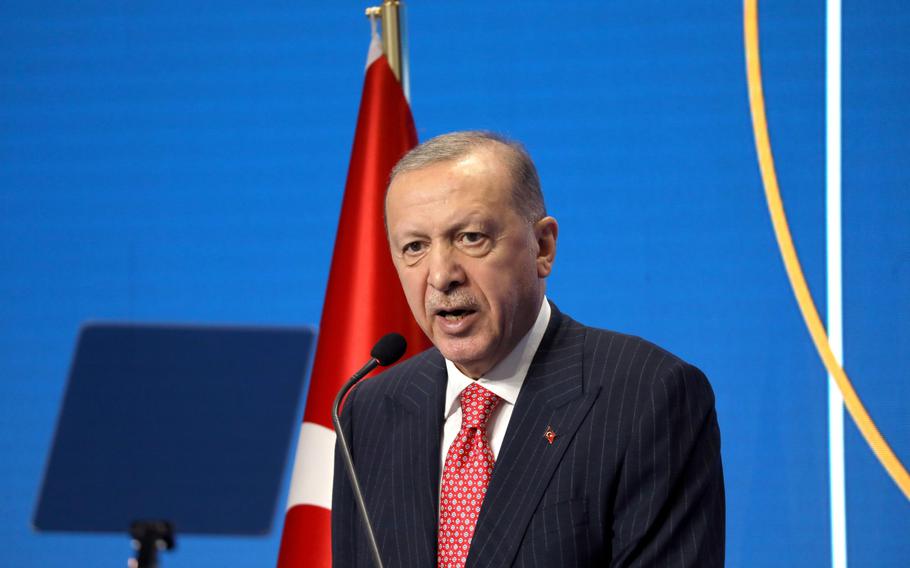
Turkish President Recep Tayyip Erdogan at the Group of 20 summit in Rome in 2021. (Alessia Pierdomenico/Bloomberg)
What exactly does Recep Tayyip Erdogan want from NATO? And more to the point, does NATO need to give it to him?
On Friday, with the alliance anticipating formal applications for membership from Finland and Sweden, the Turkish president casually tossed a wrench into the works by saying his country would “not look positively” upon the expansion.
By the rules of the North Atlantic Treaty Organization, applications must be approved by all 30 members. Erdogan is threatening not only to veto the expansion but also to undermine a demonstration of NATO unity in the face of Russian aggression dangerously close to its borders, in Ukraine.
His explanation: The two aspiring members are harboring activists from Turkey’s Kurdish minority, some of whom belong to the Kurdistan Workers’ Party, or PKK, which it regards as a terrorist group. “Scandinavian countries are like guest houses of terrorist organizations,” Erdogan said in televised comments.
Turkey has long complained about Kurdish activism in northern Europe. Ankara also feels the existing NATO membership - and the West in general - doesn’t provide adequate cooperation in its fight with Kurdish separatists. Although the United States and the European Union have labeled the PKK a terrorist organization, they support the YPG, a related Kurdish group that mainly operates in Syria, in its fight against the Islamic State.
But if Erdogan’s rhetoric on Friday was familiar, his timing smacked of opportunism. It has been common knowledge for several weeks that Helsinki and Stockholm were about to apply to join NATO, but there were no admonitory signals from Ankara. Quite the opposite, in fact. When he spoke with Finnish President Sauli Niinisto on the phone a month ago, Erdogan reportedly brought up the membership question and indicated he was in favor.
On Sunday, Niinisto said Turkey’s turnaround had left him a “bit confused.” At a meeting of NATO foreign ministers in Berlin that day, Erdogan’s foreign minister again broke from the NATO consensus to convey his concerns about the expansion. “To be specific, representatives of these two countries were holding meetings with PKK and YPG members and Sweden was also providing weapons,” Mevlut Cavusoglu told reporters.
Erdogan’s spokesman, meanwhile, said that he wasn’t closing the NATO door to the two applicants, and that Turkey could be persuaded to drop its objections. Sweden, dutifully, is sending a delegation to Ankara to find out what it would take to change Erdogan’s mind. Niinisto has said he will make another phone call. Other Western leaders will likely add their voices to the mollification effort.
The best-case scenario from NATO’s perspective is that the Turkish leader will be satisfied merely with the attention - he has a weakness for the international spotlight. Some pro forma expressions of solicitude about Ankara’s anxieties from the Finns and Swedes, along with a promise to be vigilant about any anti-Turkish activity on their soil, would allow Erdogan to claim, for his domestic audience, that he has extracted important concessions from the Europeans.
He will undoubtedly want more, including more sophisticated arms from his NATO partners and possibly some financial assistance. But the NATO countries seeking Erdogan’s signoff should demur: He isn’t in a position to hold out for very long.
The domestic audience is the key to understanding where his head is at the moment. Turkey’s economic crisis - soaring inflation and a plunging lira are just two indicators of its gravity - has left the president politically more vulnerable than at any other time in his nearly two decades at the helm. His poll numbers are poor, powerful workers’ unions are restive, the traditional opposition parties are rallying and new rivals are emerging.
With barely a year to go before he is up for re-election, Erdogan badly needs some wins. He has swallowed his pride and set aside his longstanding contempt for the Gulf Arab sheikhdoms in the hope that they will bail out the Turkish economy. But even if the billions of dollars of promised investment do materialize, it will be years before ordinary Turks see any of the benefits.
On the wider international stage, having antagonized his NATO partners for years by making a “dear friend” of Vladimir Putin, Erdogan has been a peripheral figure in the alliance’s most serious confrontation with Russia since the end of the Cold War. (He has sought the role of peacemaker between Moscow and Kyiv, but to little avail.)
And in the lead-up to next year’s election, he will likely take even more reckless measures: Expect, for instance, a reprise of his previous threats to unleash a flood of refugees into Europe unless the EU ponies up more assistance. The challenge for Turkey’s NATO partners, and for those seeking to join the group, is to hold their collective nerve.
Bobby Ghosh is a Bloomberg Opinion columnist covering foreign affairs. Previously, he was editor in chief at Hindustan Times, managing editor at Quartz and international editor at Time.